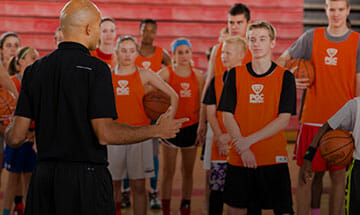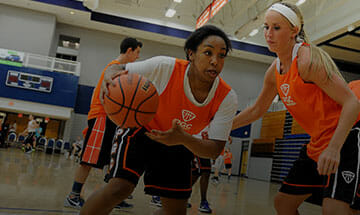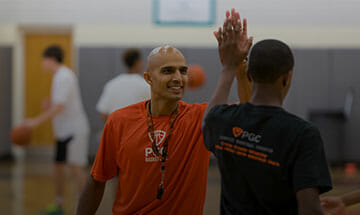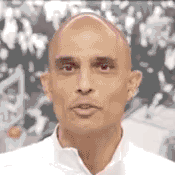Improving Basketball Speed and Quickness
Every athlete can improve THEIR performance dramatically by improving THEIR knowledge and execution.
Every young athlete seems to be interested in increasing speed and quickness. This makes sense. Speed and quickness are two of the most important ingredients in athletic success.
One big problem: it is extremely difficult for any athlete to improve dramatically in these two areas. For the most part, speed and quickness are inherited. You can jump rope a million times, run through tires, and do a thousand agility drills, but you are still not going to outrun or out-quick many athletes who have never used a jump rope and never stepped into a tire. Nevertheless, there are some things that athletes can do to compensate for a speed or quickness deficit, and few athletes pay enough attention to these.
Consider in particular, in professional sports, the number of aging or older players who manage to perform effectively in spite of not having outstanding speed or quickness.
Why?
What do experienced players do in order to make up for losing a step?
What is so valuable about experience?
Most important, experienced players know how to do things. They pay attention to the details of their sport. They know the little things that can give them an edge over their quicker, speedier opponents. Every sport is different but if you are playing against a quicker, faster player, you have to concentrate on the details of your sport and learn how to get things done effectively.
In baseball, this might mean learning how to get a bigger lead off first base and learning how to recognize the pitcher’s move to first. When you aren’t fast enough to take off and steal second by speed alone, it makes sense to pay attention to how to get the biggest lead possible and how to make a break for second at just the right instant.
In every sport there are specific ways to do things which, when learned, can make any player much more effective. Inexperienced players should focus more attention on how to play their sports than on how to improve their speed and quickness.
Athletes should get in great physical condition. One of the best ways to outrun and out-quick your opponents is to be ready and energetic when they are tired. In nearly every game, there are times when athletes rest, pace, or loaf. The faster the tempo, the stiffer the competition, the more opportunity for the superbly conditioned, alert athlete.
Try any kind of physical improvement you can. Continue with anything you feel may be helping, and remember to give whatever you do a real chance. Don’t quit after a week. Give time to whatever it is you decide to do. Just don’t worry about the things you can do little or nothing to improve.
Each summer I am astonished by the inability of groups of dedicated athletes to practice effectively. Although physically and verbally committed to working hard at their sports, most athletes find it extremely difficult to learn and practice new techniques effectively.
At a summer camp some years ago we spent most of a morning session teaching young basketball players the details of screening and rolling and using a two-man-game to get an easy basket. Just a few minutes later, we started to play games. One of the players got a pass and saw a teammate running toward him to set a screen. With total seriousness, the player with the ball waved his teammate away and yelled, “Not now, we’re playing a game!”
That kid had made no correlation between what we were teaching and how that stuff could help him in a game. Of course, he was young and inexperienced. But his extreme example is nonetheless typical of older, more experienced players as well. They have great difficulty changing their typical way of doing things in order to add a new technique or to add precision to their habits.
If you want to get quicker and faster, concentrate on technique. Technique is where the biggest dividends are. While your opponents are out there doing a million rope jumps, consider staying inside and reading, or consulting a real expert and learning how to do what you do better.
I see hundreds of basketball players each summer striving to become quicker so they can beat a quicker defender backdoor for a layup against a pressure defense. All of them would achieve their goals more quickly if they learned how to set up their defenders, how to sell their fakes on the perimeter, and when to make their breaks for the basket. Ninety-nine percent of the players I observe can be guarded by very slow defenders because they give away their intentions too soon and make their breaks poorly, too far from their defenders or too close to the basket.
Good technique would free them easily, but they are usually too busy trying to get a head start, too busy edging their way toward their goal, and in too much of a hurry to adequately set up their defenders, to carry out their fakes, and to cut at the right time.
Speed and quickness are great, but there is no substitute for great technique. For every player who asks me about details of technique, a hundred others ask if I knew how they can improve their quickness and speed. That ratio should be reversed. Concentrate on technique. That’s where the payback is.
—Excerpted from the book, “Think Like a Champion”
Related Articles
5 Ways to Practice Mental Toughness
Here are five ways to practice your mental toughness off the court. If you practice these five things, every day, you’ll develop greater self-discipline. You’ll become unstoppable in anything you do. It is five things you will have to rise above your feelings every day. That is how you build mental toughness. You develop, as a habit, a muscle of rising above your feelings to level of your aspirations and commitments.
Why Is My Performance Inconsistent?
Do you ever feel like your performance in games is consistently inconsistent? That you’re putting in the same hard work at practice every day, yet some days you play really well and others you don’t play well at all? If that’s you, you’re not alone. If that’s not you, don’t worry—the frustration is coming soon!
Quit Being So Hard to Coach
COACHES HAVE FAVORITES!! Of course, they have favorites—their favorites are the players they can trust, on and off the court.
Here are four reasons you may not be getting the playing time you think you deserve.
About PGC
PGC Basketball provides intense, no-nonsense basketball training for players and coaches. Our basketball camps are designed to teach players of all positions to play smart basketball, be coaches on the court, and be leaders in practices, games and in everyday life.
We combine our unique PGC culture with a variety of teaching methods and learning environments to maximize the learning potential of those that attend our sessions. In addition to spending 6-7 hours on the court each day, lessons will be reinforced through classroom sessions and video analysis.
Our goal at PGC is to empower you with the tools to fulfill your basketball dreams, while also assisting you in experiencing the joy of the journey.
To learn more about PGC Basketball, including additional basketball training tips and videos, visit our YouTube Channel or find us on Facebook, Instagram, and Twitter.













Share This Post